These people still believe in democracy (little d) and are working to keep it.
WASHINGTON ‒ For Joseph Atou, democracy is sharing with hundreds of visitors the history of America’s foundation.
For Gregg Amore, it’s teaching the younger generation the importance of civic engagement.
And for John Suttles and Tina Barton, democracy means ensuring elections work.
According to the Merriam-Webster dictionary, democracy is government by the people. On the ground that can look different to different people, but for some, what they call democracy is at the heart of what they do and what they hope to protect.
“Democracy is that lever, that tool, that gift that allows us to move toward a more perfect union,’’ said Sam Daley-Harris, author of “Reclaiming Our Democracy. Every Citizen’s Guide to Transformational Advocacy.” “That assumes that it wasn't perfect in 1776 for sure. And here we are now, it ain't perfect now. Our lever, our tool, our mechanism, our gift is democracy.”
In some spaces, the word "democracy" has spurred intense debate among candidates, activists and scholars.
It has topped some polls as an important election issue. In January, 49% of Democrats and 29% of independents cited the future of democracy as the top issue facing America, according to an exclusive USA TODAY/Boston Globe/Suffolk University poll in New Hampshire. A Washington Post poll released last week found that the majority of voters of all political beliefs consider "threats to democracy in the U.S." important. And that's true of more than 70% of voters who say they strongly support either President Joe Biden or former President Donald Trump.
Ahead of the nation’s July 4 celebrations, USA TODAY talked to a range of people dedicated to democracy, including a former election official, a veteran of the civil rights moment and a tour guide at the U.S. Capitol, about what democracy means to them and how they’re doing their part to move it forward.
As the stories of these citizens show, sustaining democracy takes work. And support for these efforts remains crucial, Daley-Harris said.
“It's the political will of the people that makes and sustains the political will of governments,’’ he said. “Make sure there's a next step that people can take to take the enthusiasm onward rather than have it fizzle."
Welcome to the United States
Joseph Atou
Joseph Atou, dressed in a bright red jacket, handed each of the 40 tourists a headset at the U.S. Capitol Visitors Center.
“Over here,’’ he directed. "Move forward, please.’’
Atou is one of dozens of guides leading tours of the U.S. Capitol, offering visitors a chance to see and hear how democracy here works. During the peak from March through August, about 10,000 people a day visit the center.
Atou believes he’s helping educate Americans and foreigners about the nation, its checks and balances, its history and its evolution.
“A lot of the time people see the government as far away,’’ Atou explained between tours on a recent afternoon. “They don’t really understand a lot of how it really works.’’
But after the nearly hourlong tour, Atou is excited when visitors tell him, ‘‘Oh, I didn’t know that is how it is.’’
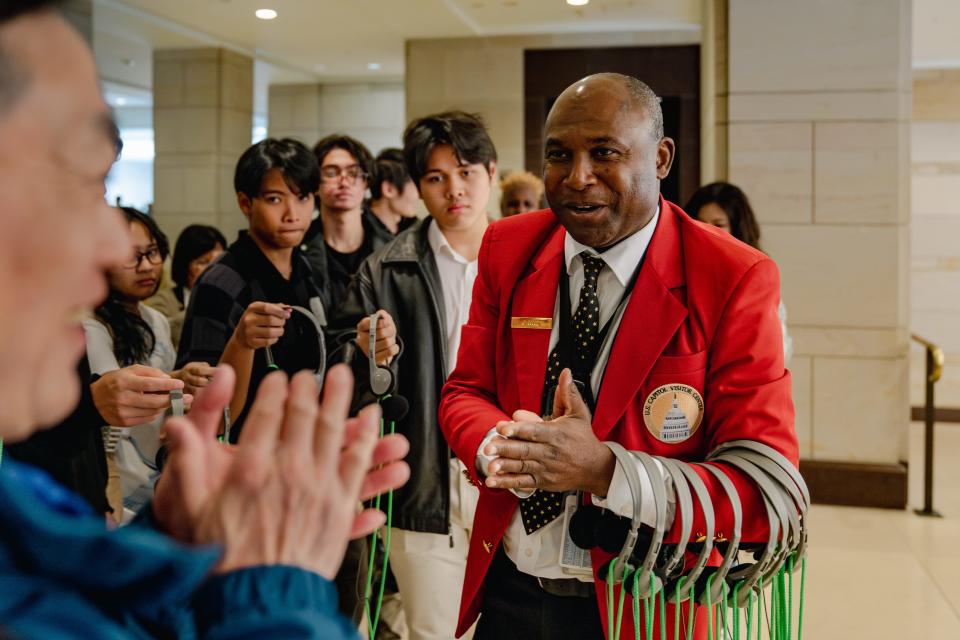
At the start of that day's tour, Atou asked foreign visitors where they were from. "France," "Austria," "Indonesia" and "South Korea," they yelled out.
“Welcome to the United States of America,’’ he responded.
Atou then guided them through the Capitol, pointing to paintings like the presentation of a draft of the Declaration of Independence, busts of icons like Martin Luther King Jr., and statues of presidents like Thomas Jefferson.
The group circled the Grand Rotunda at the heart of the Capitol, where Atou pointed way up to the dome and shared that dignitaries like Sen. John McCain had lain in state there. Visitors peppered Atou with questions. He rattled off answers.
Atou especially enjoyed explaining how each state selects statues to represent them in the National Statuary Hall, only steps from the Rotunda. He urged visitors, while on Capitol Hill, to reach out to their congressional representative.
“It’s a way for me to tell them to get involved,’’ Atou said.
At the end of the tour, visitors applauded.
Theresa Raffeiner from Austria said she appreciated the lesson and Atou’s humor. “It wasn’t so serious,’’ she said. “I don’t want to feel like I was on a field trip.’’
Atou, 50, an independent who lives in Rockville, Maryland, has been a tour guide for 11 years.
He was born in Cameroon in central Africa and later lived in France. He combined passions of his grandfather, an artist, and his father, a high school history teacher, to study art history in Paris. He later did research in Germany for his masters in art history.
Because of his background, Atou said, it’s easy to incorporate history with art during his tours.
He also uses his experiences in other countries to relate to foreign visitors. At stops on his tour, he explained in French to tourists why histories of the countries were connected. He also speaks German and Greek.
Atou said he learned a lot about American history while living in other countries.
“But you have to come here to actually understand that,’’ he said. “When they talk about slavery, for example, they will tell you that there were horrible things, but they will never tell you about Emmett Till. They will never tell you about Dred Scott. They will just portray that as evil. They were mean people. They enslaved people.”
“Working here really helped me to understand the position of African Americans.”
All those experiences help drive Atou’s passion for his work. He also helped design the Heroes of Civil Rights tour at the Capitol.
“It’s fun,’’ he said. “I try to teach, but the American system is a little bit complex.’’
Preserving fair and safe elections
Tina Barton
Tina Barton has traveled to more than 30 states in the past two years. In each place, she has met with local, county and state officials, those who conduct hazmat details, and people who work in Homeland Security or for the FBI.
It's all in the name of preserving fair and safe elections, which she considers a crucial part of the democratic process.
Barton helps municipalities create plans for Election Day.
She spent 32 years working in government across Oakland County, Michigan, half as an elections clerk.
This type of preparation is Barton’s passion. And after facing death threats, it has become personal.
“The goal is to have an operations plan in place with anybody who has some sort of stake in the voting process in case there is an event that could range from intimidation, de-escalation to threats to lives,” said Barton, vice chair of the nonprofit Committee for Safe and Secure Elections.
”We walk through several scenarios to try to make their communities safer,” added Barton, also a senior expert for The Elections Group. “The demand has been so great. They come away with their eyes more wide open. We want them to prepare their plans. To implement them. To test them.”
A married mother of two adult children, Barton said election workers have faced increased scrutiny since 2016, but it intensified in 2020. A Republican, Barton doesn’t believe doubting election workers is a partisan issue, either. “We’re living in pretty divisive times right now,” she said.
She cites a recent poll by the Brennan Center for Justice at New York University School of Law, a liberal or progressive nonprofit law and public policy institute, that found nearly 40% of local election officials had been threatened, harassed or abused on the job. “That’s a 10% increase,” Barton said. “A huge number.”
The poll also showed that more than 90% of municipalities have increased their election security since 2020. “Another huge number,” Barton said.
Andrew Nickels, of Carmel, Indiana, has been convicted of threatening Barton’s life and her family. After the 2020 election, he left a menacing voicemail and accused her of fraud when Trump and then-Republican National Committee chair Ronna McDaniel alleged voter irregularities in Oakland County, where Barton was in charge.
Barton denounced the accusations and state officials said McDaniel’s claims had no merit.
“It was hurtful, shocking, stunning, all the things I never expected,” Barton said. “You can either let it defeat you or define you. I clearly let it define me and I’m absolutely stronger. I’m using my experiences and skills to help others not go through what I did.”
Barton said she plans to give a victim impact statement when Nickels is sentenced next month.
“His threat did not cause me to back down. In fact, it made me stronger,” Barton said. “It makes election officials stronger. They work incredibly hard to make sure voters can have a free, safe and accurate election.”
On a bridge and at a crossroads
John Suttles
When John Suttles takes Highway 80 into Selma, Alabama, he’s struck by how much the city still looks like six decades ago when he and others marched across the Edmund Pettus Bridge to demand voting rights for its Black citizens.
There’s still a gas station, a sign welcoming visitors and the bridge.
The 76-year-old veteran of the Civil Rights Movement makes the pilgrimage nearly each year in part to share with young people the importance of voting.
“You have to vote because that's the way democracy works,’’ he said. “If you don't vote, you don't have a democracy and that is where we at now at this crossroads in the United States.”
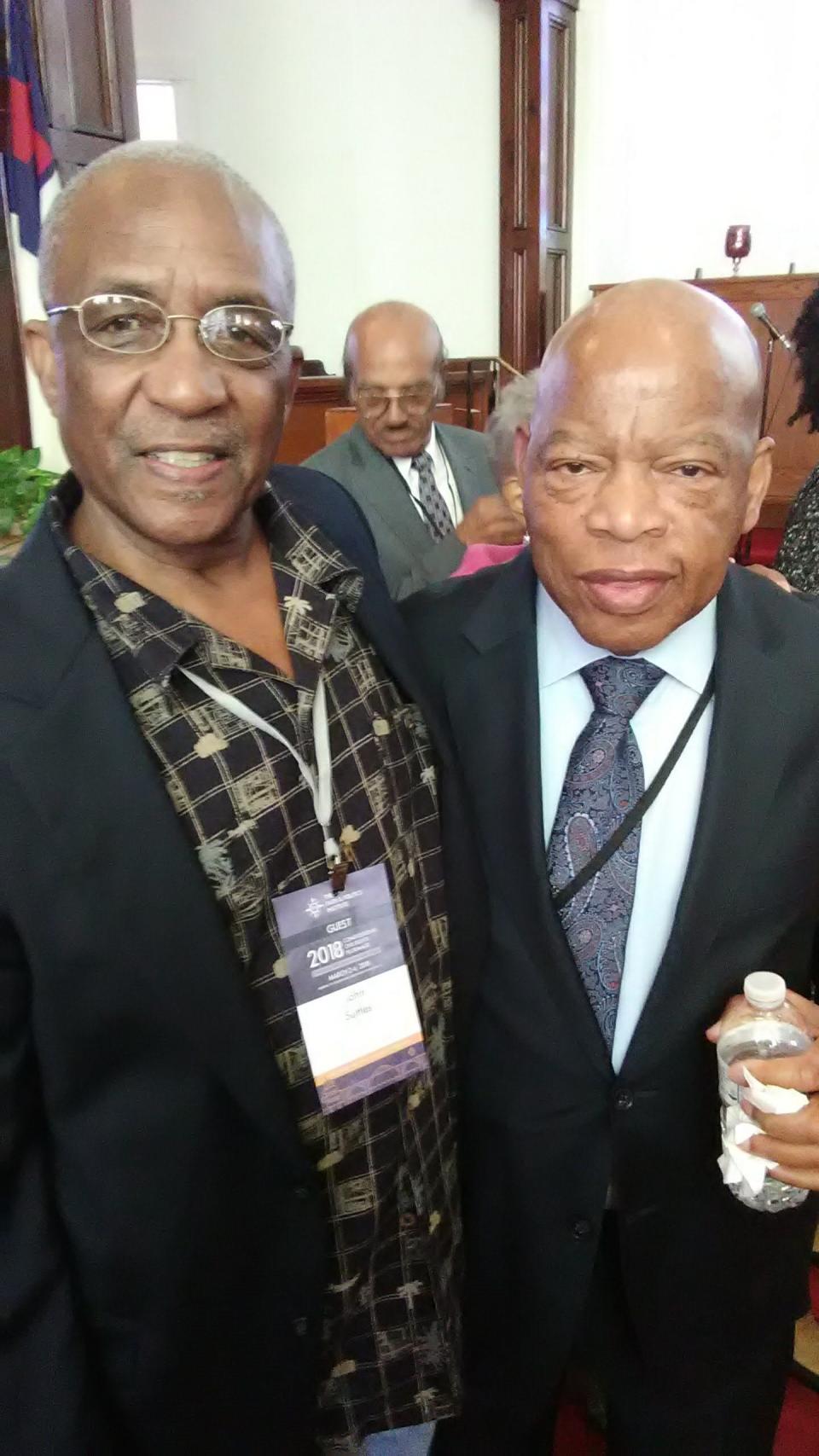
For Suttles, a working democracy means his efforts 60 years ago are paying off with more people of color registering to vote and casting ballots. To continue that effort, Suttles champions the importance of voting at events, including a Juneteenth panel in his hometown of Johns Creek, Georgia. Earlier this year, he joined a virtual panel hosted by the federal Election Assistance Commission.
“I am constantly looking for opportunities to talk about it with anybody that wants to listen,’’ said Suttles, a retired Minnesota transit worker. “There’s a lot of naysayers about the vote. But that just doesn't make sense to me.’’
Since he was a teenager, Suttles said, he has been working on “this thing called voting and democracy and human rights.’’
Suttles, who lived outside Selma, joined peaceful protesters crossing the Edmund Pettus Bridge in a march from Selma to Montgomery, Alabama, in 1965. Like others, he was beaten by police on that "Bloody Sunday."
Suttles donated the bloodstained Army jacket he wore that day, loaned to him by his uncle, to a National Park Service interpretive center in Selma.
He and his wife, Kay, often join the annual bipartisan pilgrimage to Selma when civil rights veterans, U.S. presidents, members of Congress and others gather to commemorate the march. Georgia Rep. John Lewis, the late civil rights icon, used to lead the trip.
Suttles, a Democrat, appreciates the chance to talk to young people who often ask about his experience on ''Bloody Sunday.''
“They're always fascinated that a young person like myself back in them days would have enough to get up knowing that there's a 99% chance that you're going to get beat up and (yet) you go fight for somebody else's civil rights and voters' rights and human rights,’’ he said.
Suttles said he would have it no other way.
“I bought into it in the '60s,’’ he said. “It’s sort of like a religion. It’s part of me now. I have to be involved in some capacity that can make a difference.’’
Standing up for women
Poojitha Tanjore
In March, a group of female politicians, activists and other prominent community leaders came together at a local high school in Virginia to discuss the importance of women raising their voices and fighting for change.
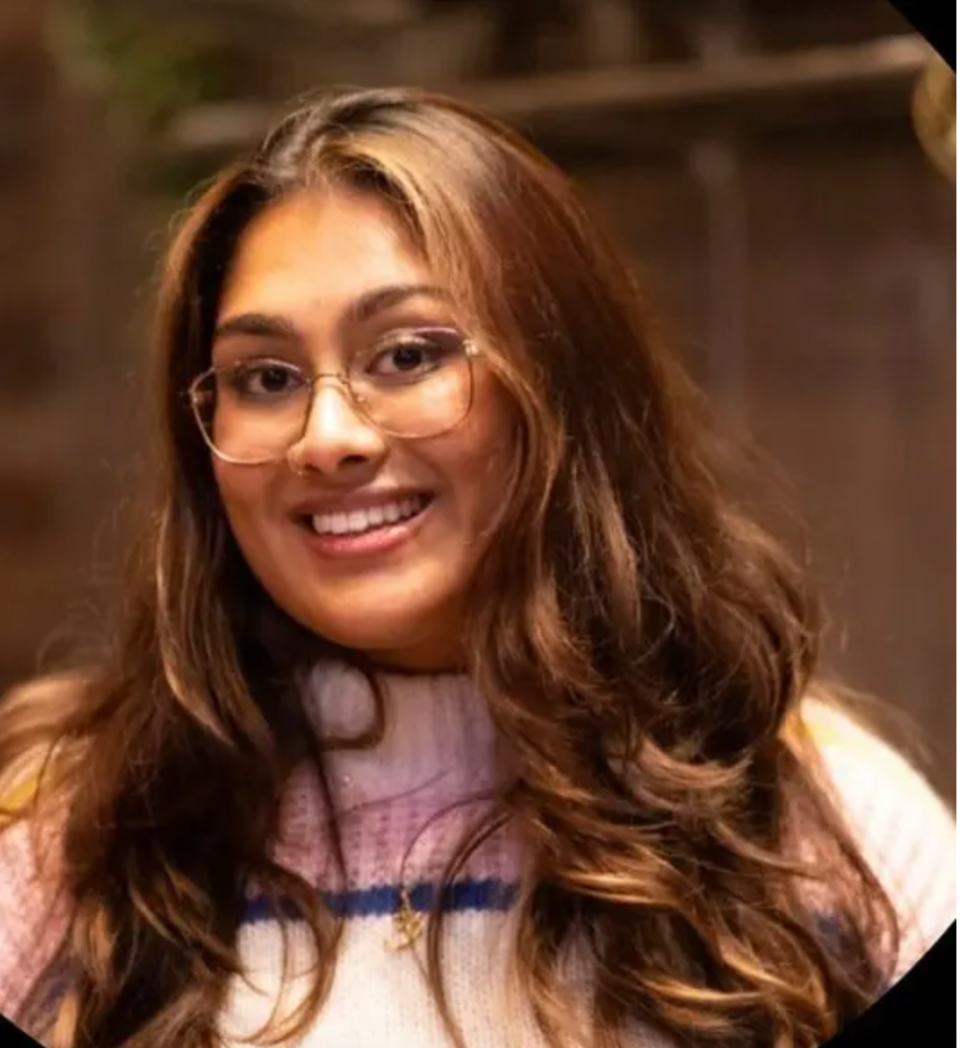
Among the group was 22-year-old Indian American Pooja Tanjore, a master’s student at Columbia University in New York and a diplomatic fellow with USAID, which administers foreign aid and development assistance.
“I borrowed my mother's blazer. … I didn't feel like I knew all the etiquette to be in this space," she joked to an almost equally youthful audience of high schoolers, according to the Loudoun-Times Mirror. "I'm going to have to buy my own blazers.”
Tanjore, a Cincinnati native, told USA TODAY that women have “really always been at the core of what's important to me about democracy.”
Everyone has the right to speak and have a voice, she said.
“And I think women have historically been neglected in that space, and so it's very important that they have the right to speak and feel empowered.”
The fight for womens’ rights and representation is something Tanjore has been involved in since her teens ‒ starting at the grassroots level.
At age 16, she founded a Virginia chapter of the national nonprofit Rise to Run, aimed at encouraging high school and college women to run for office.
Working on former Secretary of State Hillary Clinton’s 2016 presidential campaign, Tanjore said, helped her form a strong network to launch the chapter. The group helped bring together young women from different backgrounds and connect them with mentors.
Though the chapter is now defunct, she has continued serving in other ways, such as campaigning for female lawmakers and speaking at summits aimed at empowering women. Last year, she worked as a legislative fellow in Democratic Virginia Rep. Jennifer Wexton’s office.
“I grew up with people knocking doors (and) I worked on a bunch of political campaigns, and you just see all this energy of people who really care about local politics, like the causes in their local communities, because people know that change is made locally,” she said.
“So even just on that grassroots level, it's so inspiring, and it just continues to reinforce how important democracy is.”
Her great-grandmother, forced to marry as a child, was her biggest source of inspiration to get involved in this work, she said. The older woman, who died two years ago, had children while still a teenager herself and was widowed just a few years later.
“Seeing what that did to her really inspired me to work toward women's rights.”
Keeping democracy is everyone's job
Gregg Amore
It's tough to keep teenagers from their phones these days. Gregg Amore managed to keep a hotel ballroom-full laughing, raising their hands and nodding along this spring as he talked about the importance of maintaining American democracy.
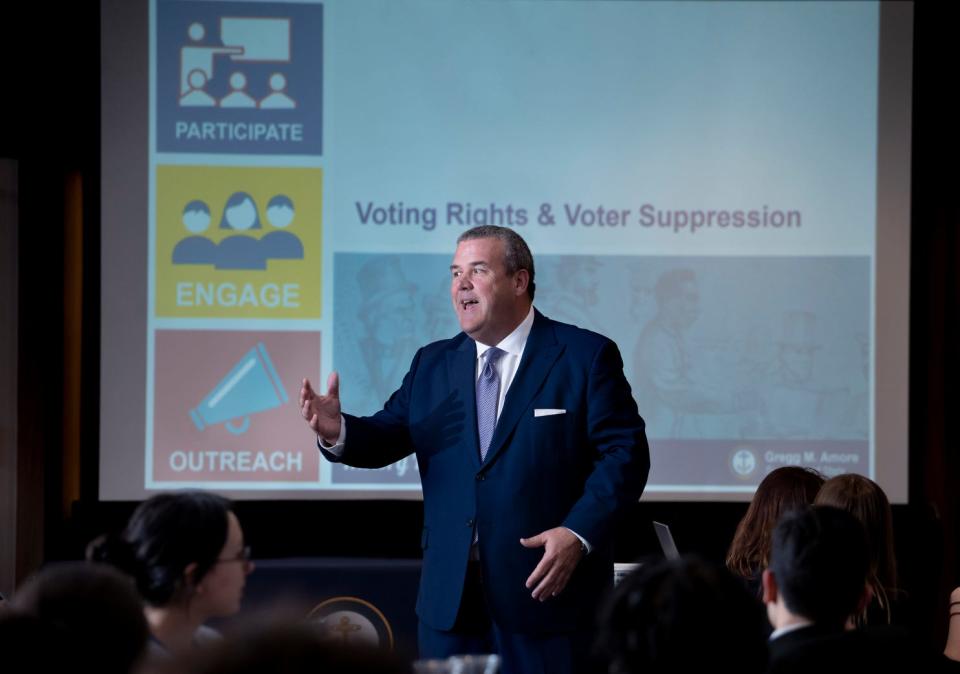
Power, he reminded his audience of high schoolers at the Rhode Island Civic Leadership Summit, is something you want to hold onto once you have. He doesn't want to give up his own job as Rhode Island's secretary of state, he noted.
His 30 years of teaching high school students have helped him hone his message. Some of the students had even heard him give this talk before. But they didn't seem to mind. A few of the anecdotes were fresh and his questions kept them awake, several said.
A lifelong Rhode Islander with the accent to prove it, he doesn't talk down to the high schoolers, many of whom will be voting in their first election in November. He has nailed a tone that says "I respect your intelligence, but I also have information you'll want to know."
Amore, 57, a former hockey and baseball coach, mentioned the charge that the 2020 election was stolen. Instead of dismissing it out of hand, as many fellow Democrats do, he explained that in 2020, three Rhode Islanders voted in both Florida and Rhode Island. All three were caught and prosecuted.
"Is there voter fraud? Yes. Is there widespread fraud? No," he said, explaining the auditing process his state and others use to ensure that the vast majority of votes are counted accurately.
"We don't have a voter fraud problem in this country," Amore told the students. "We have a voter suppression problem in this country."
Ancestors of many of the people who have trouble accessing the polls today were prevented from voting by intimidation tactics or so-called literacy tests that asked impossible questions, like "How many bubbles does this bar of soap create?" he said, holding up a bar to emphasize the absurdity.
"If Americans don't pay attention, if we don't push back, you will see proposals for some sort of literacy test for future voters."
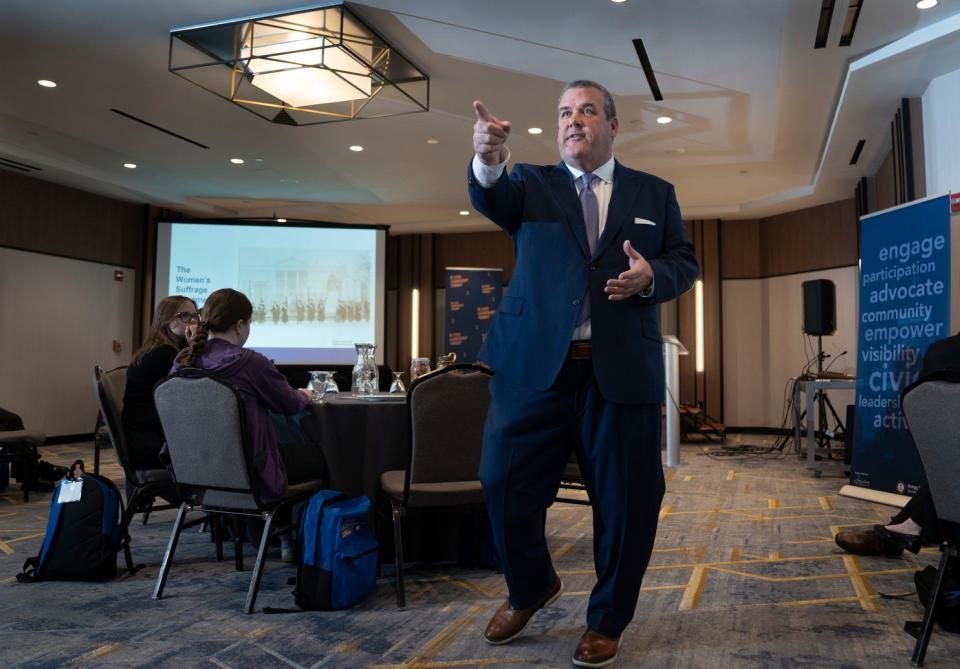
He closed his talk by citing Benjamin Franklin, who, at age 81, ran into a friend as he was walking out of the 1787 Constitutional Convention in Philadelphia.
"What do we have?" she asked him about their newly established form of government. "A republic or a monarchy?"
"Madam, we have a republic ‒ if you keep it," Franklin supposedly replied.
"That's your job," Amore charged the young people listening to his vision of democracy. "To keep it."
This article originally appeared on USA TODAY: Here's what the work of democracy looks like


